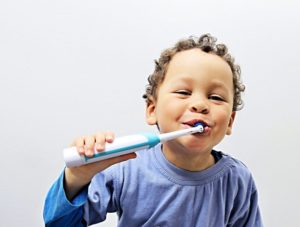
Roughly 20% of children ages 5 to 11 and 13% of adolescents ages 12 to 19 have at least one untreated cavity. While cavities are easily preventable through the use of fluoride toothpaste, limiting sugar consumption, and proper brushing, using the right kind of toothbrush is also an essential part of oral healthcare. Studies show that after three months of use, electric toothbrushes reduce plaque by 21% and gingivitis by 11%. Though there are electric toothbrushes for kids of various age groups, choosing the correct one will make good dental hygiene that much easier to attain.
Benefits of Electric Toothbrushes
While electric toothbrushes for kids are more expensive than manual ones, they offer a number of additional perks. Some benefits of electric toothbrushes may include:
- Require less effort when brushing
- Multiple speed settings
- Built-in features such as reminders when the toothbrush head needs to be replaced, pressure sensors, and timers
- More effective in plaque removal compared to manual brushes
- Can improve oral health in those with braces
- Longer lasting therefore creating less waste
When to Buy Your Child an Electric Toothbrush
Though children can begin using electric toothbrushes without toothpaste with supervision as young as 2-years-old, many families introduce electric toothbrushes between ages six and eight. Since negative experiences with brushing could leave your child with a bad impression, it’s important not to force it before they’re ready. When they see a parent using one, many children may even ask for an electric toothbrush on their own. Turning brushing your teeth into a family activity can also aid in your child’s transition from a manual toothbrush to an electric one.
How to Choose Electric Toothbrushes for Kids
Even though many parents may be tempted to buy a higher quality electric toothbrush for themselves than for their children, lower quality toothbrushes may have abrasive brush heads that can damage tooth enamel. Other factors to consider while evaluating an electric toothbrush include:
- Appropriate brush head shape and for a child-sized
- Use a plaque disclosing agent to compare effectiveness of electric versus manual brushes at removing plaque buildups
- Rechargeable toothbrushes are generally better quality
- Bristles on higher quality toothbrushes are less likely to scratch tooth enamel
Though the process of moving your child from a manual to an electric toothbrush can be a bit daunting, remember not to force it and to lead by example. With an array of electric toothbrushes to choose from, there’s no shortage of quality picks to meet your child’s unique oral health needs.
About the Author
Dr. Kevin Labosky earned his DMD from Temple University School of Dentistry in 1997 and worked as an associate dentist for seven years before opening his own practice in 2004. Dr. Labosky and his talented team of oral health specialists take pride in serving State College patients of all ages through compassionate, high quality dental care. He strives to continue learning about advancements in dentistry and is a member of the Pennsylvania Dental Association, the American Dental Association, the Centre Dental Society, and the OKU Honorary Dental Society. To learn more about when it’s the right time to buy your child an electric toothbrush, call (814) 364-4799 or visit our website.



